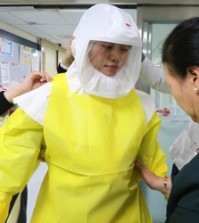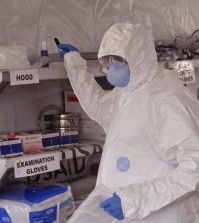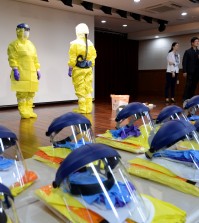- California Assembly OKs highest minimum wage in nation
- S. Korea unveils first graphic cigarette warnings
- US joins with South Korea, Japan in bid to deter North Korea
- LPGA golfer Chun In-gee finally back in action
- S. Korea won’t be top seed in final World Cup qualification round
- US men’s soccer misses 2nd straight Olympics
- US back on track in qualifying with 4-0 win over Guatemala
- High-intensity workout injuries spawn cottage industry
- CDC expands range of Zika mosquitoes into parts of Northeast
- Who knew? ‘The Walking Dead’ is helping families connect
40 apply to be on Ebola team in Korea
By Jung Min-ho
About 40 doctors, nurses and medical staff have so far applied for the 10 civilian posts on a team to be sent to help fight the Ebola epidemic in Western Africa.
According to the Ministry of Health and Welfare, 40 doctors, nurses and medical technicians have submitted applications since Oct. 24 ― the closing date is Nov. 7.
A ministry official told The Korea Times. “This is definitely more than expected.”
In addition to the 10 civilians, 10 members of the military will make up the 20-member team.
“Some said they would even spend their own money to go to the region to volunteer and help, if they fail to make it onto the team,” the official said.
“We actually need more nurses than doctors as one doctor and two to three nurses usually operate together. Their participation is much appreciated,” he said.
Applicants must know about infectious diseases and have English language proficiency.
Where they will be dispatched ― Guinea, Liberia, or Sierra Leone ― and what they do will be decided next month.
Once selected, they will get safety training, such as how to wear and take off protective clothing, under the supervision of the Korea Centers for Disease Control and Prevention.
Some experts believe that going to the Ebola-hit region will be a great opportunity for medical personnel to learn about the disease.
Yet the risk is real; there is no proven cure or vaccine for Ebola, whose mortality rate can reach 70 percent.
The ministry is preparing for a possible infection.
The most likely case is that those infected will be taken to medical facilities in the United States or Europe.
The U.S. Centers for Disease Control and Prevention has recently issued stricter guidelines for medical professionals treating Ebola patients, calling for them to be fully covered with no skin exposed, undergo repeated safety training, and every single step of wearing and removing safety gear must be done under a supervisor whose responsibility is to prevent mistakes.
Safety concerns about health-care workers caring for Ebola patients are being raised in the U.S. too, as two nurses were infected after treating a Liberian man who died from it at a hospital in Dallas this month.
Global health authorities are struggling to contain the world’s worst Ebola epidemic since the disease was identified in 1976.
More than 10,000 people have been infected with Ebola and nearly half of them have died, according to the World Health Organization.












![일본 사도광산 [서경덕 교수 제공. 재판매 및 DB 금지]](http://www.koreatimesus.com/wp-content/uploads/2024/07/PYH2024072610800050400_P4-copy-120x134.jpg)


